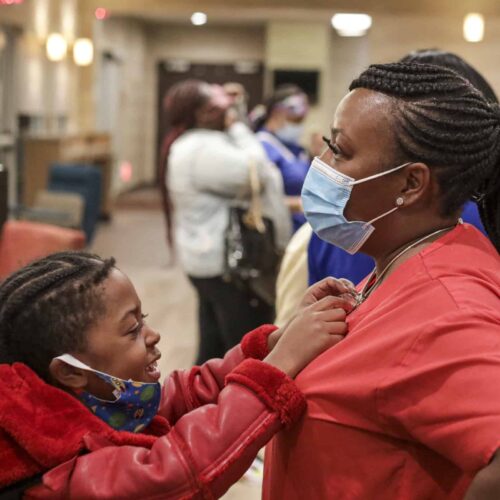Introduction
Economists – and others – have been obsessing over the monthly jobs numbers released by the U.S. Department of Labor since the start of the pandemic recession. After the economy lost a record 22 million jobs back in the spring of 2020, job growth has been slow and uneven, benefiting white workers the most.
The latest jobs report, released earlier this month, seemed promising. The unemployment rate dropped to 4.2% in November and 542,000 people without work found jobs. News articles pointed out that the unemployment rate for Black women fell from 7% to 5% – a striking shift, considering that Black and Latina women suffered the brunt of the pandemic’s job losses.
But there was one alarming statistic that few economists teased out: the number of Black women who dropped out of the labor force altogether. Since September, 181,000 Black women have left the workforce, even as the labor force participation rate of women in all other racial groups has increased.
Millions of working mothers had quit their jobs or stopped looking for work in 2020, largely because they were left without childcare options when schools and day care centers closed.
“Available childcare slots diminished during the pandemic, and we already had a shortage of childcare,” said Nicole Mason, president and CEO of the Institute for Women’s Policy Research. “Black women and Latinas are still struggling.”
Research shows that one in three day care centers that closed during the pandemic remained closed in April. And daycare providers were much more likely to close in Black and Latino neighborhoods, according to a study by researchers at Columbia University’s Center on Poverty & Social Policy.
Scarce childcare options are likely pushing Black women out of the labor force, Mason said. After all, data shows that it’s Black women with children in particular who have stopped looking for work:
But Mason points to a potential silver lining in the jobs report. It’s likely that Black women are refusing to return to certain low-paying jobs, which put them and their families at risk of contracting COVID-19, while not offering any paid sick days or health insurance.
Before the pandemic, Black women were largely segregated into low-paying jobs in healthcare and retail. For example, about 36% of female healthcare aides are Black. These are among the lowest-paid jobs in the country, with long hours and few benefits, if any. While some industries have raised wages in recent months to attract workers, wages have remained flat in healthcare and social assistance fields.
“These are rational decisions that women are making,” Mason said. “Would I want to go work somewhere where I might get infected with COVID, but I don’t have health insurance or paid time off? Of course I wouldn’t.”
Ideally, companies in these fields will get the message and offer better benefits and raise wages if they need more workers, Mason said. Experts say it would help if Congress would pass legislation to guarantee paid sick days to all workers or raise the federal minimum wage.
Providing families with affordable childcare options is also crucial, said Janelle Jones, chief economist at the U.S. Department of Labor.
“This is why the investments in child care, pre-kindergarten, and Head Start contained in the Build Back Better Act are so vitally important to the ongoing economic recovery,” she wrote last week, referring to President Joe Biden’s legislative proposal, which the Senate may consider this month.
The proposed bill includes money to increase the supply of child care, bring down the cost for parents and raise wages for child care workers to be more comparable to teachers’ salaries. Black women make up 16% of all child care workers.
“As we are seeing across the economy, the problem is not a lack of workers who are able to do these jobs but rather that the low pay is an insufficient draw for the work required,” Jones wrote.
Correction: Dec. 17, 12:45 p.m.: An earlier version of this story incorrectly noted Nicole Mason’s last name as Cohen on fifth reference.
Help support this work
Public Integrity doesn’t have paywalls and doesn’t accept advertising so that our investigative reporting can have the widest possible impact on addressing inequality in the U.S. Our work is possible thanks to support from people like you. Donate now.
Read more in Inside Public Integrity
Watchdog newsletter
After a spike in anti-Asian hate crimes, the government response stalls
The Biden administration has not delivered on one of the main mandates of the COVD-19 Hate Crimes Act.
Watchdog newsletter
Challenges to the Voting Rights Act far from over
‘A Hail Mary pass in a world where people are more receptive to Hail Mary passes.’





Join the conversation
Show Comments